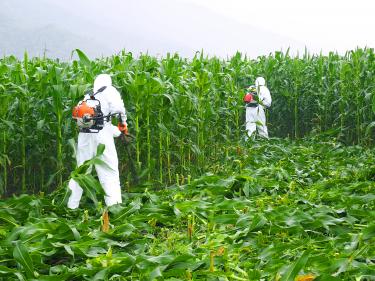With Hualien County yesterday becoming the latest area to be affected by fall armyworms that have been wreaking havoc on the nation’s farms, Kaohsiung as well as Nantou and Pingtung counties were the only areas still free of the pest, the Council of Agriculture said.
Thirty-nine fall armyworm sightings have been reported nationwide since Thursday, when the council asked local governments to check for the pest, Council of Agriculture Deputy Minister Chen Junne-jih (陳駿季) said.
The moths likely flew across the Taiwan Strait from China, propelled by a southwesterly airstream, as their spread seemed sporadic rather than originating from a single location, he said.
As of press time last night, Kaohsiung, Nantou and Pingtung remained the only areas that had not been affected, council data showed.
One infestation in Hualien was in a corn field in Shoufeng Township (壽豐) owned by a man surnamed Hung (洪), who reported seeing the pests on Thursday morning, the council said.
The Hualien District Agricultural Research and Extension Station and the council’s Bureau of Animal and Plant Health, Inspection and Quarantine later that day dispatched personnel to the farm to collect samples, which confirmed an infestation, it said.
Authorities yesterday morning sent an excavator to destroy the corn field, with the affected crops buried 3m underground and covered with 4m of calcium cyanamide-infused compost to exterminate the moths, it added.
There were three other reports of fall armyworms in Shoufeng and Jian Township (吉安) yesterday, the council said.
In addition to leveling the corn field of a farmer surnamed Hsieh (謝) in Jian, plant health and quarantine specialists also set up pheromone traps for adult armyworms to prevent the infestation from spreading, it said.
Three of the affected sites had adopted organic farming practices, Hualien County Commissioner Hsu Chen-wei (徐榛蔚) said.
There are more than 2,000 hectares of farmland in the county, which would likely have to weather heavy losses from infestations, she said.
The central government and the Hualien County Government would evenly shoulder the cost of compensating farmers for destroyed crops, she added.
However, as organic farming is more expensive than other methods, Hsu requested that the central government increase the proportion of compensation it contributes to 80 percent to ease the financial burden on the county government.
Fall armyworm larvae have a characteristic inverted yellow “Y” on their snout and four trapezoids along each segment of their torso. While they bear a strong resemblance to tobacco cutworms, fall armyworms breed faster and adults are adept fliers.
The moths are capable of inflicting significant damage to farms, especially those with crops such as corn, rice, sorghum, cotton, mustard, gourds and eggplant.
Additional reporting by Chien Hui-ju
Source: Taipei Times - 2019/06/15





















